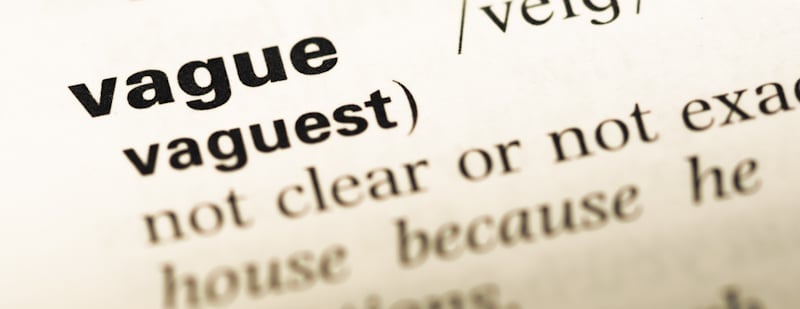Words are a unit of languages and the backbone of any communication. It is vital to understand the definition and meaning to comprehend what’s communicated to you. In your journey to improving your language and adding more vocabulary, learn the word “vague.”
Vague means that something written or spoken isn’t clearly expressed or explained. It is used when something is not well understood, defined, or grasped. Everyday use of “vague” revolves around information that doesn’t have a definite meaning. It can also be defined as something “subconscious.”
Now that you have a rough idea of “vague definition,” let’s go back to its history, etymology, use in sentences, and much more. It’s the best way to give you confidence in its usage when writing and speaking. More so, you will better understand the word when reading it or getting data that contains the word.

What is the Definition of Vague?
The Merriam-Webster dictionary gives three meanings of the word “vague.” As an adjective: 1. “not clear in meaning: Stated in a way that is general and not specific.” 2. “Not thinking or expressing your thoughts clearly.” 3. “Not completely formed or developed.”
The best way of understanding the meaning of “vague” is by first understanding how it makes you feel. When something is “vague,” it will leave you feeling confused and uncertain about the situation. Also, most people use this word when they are not sure of the information, their thought, or the information they are giving. Example: The lawyer was vague on where she got the evidence.
As you continue to learn about the word vague, you will come across various forms. We’ve highlighted two forms to help you learn the words and how to use them in a sentence to avoid errors. They include:
Vaguely
The word vaguely is a verb meaning “roughly” or “slightly.” Vaguely is primarily used in situations that are uncertain, unclear, or indefinite. Example in a sentence: She gestured vaguely towards the office.
Vagueness
The word vagueness is a noun that does not have preciseness in thought and communication. It can also be defined as a lack of certainty and distinctness. Examples in a sentence: Given the vagueness of the instructions, we did very well to pass the exam.
What Is The Meaning Of Vague?
Vague also means something ambiguous or not unambiguous. Though rarely used in this way, “vague” can also be defined as not apparent or not very visible.
But still, the word vague has several meanings. According to the information found in most dictionaries, vague means something:
- Stated in a way that is too general or not specific.
- Not expressing one’s thoughts clearly.
- Not completely formed.
- Not strongly felt.
- Not able to be seen clearly.
To elaborate more on that, when something is vague, it does not have a precise meaning. It is not easy to define, explain, or understand it. The word can show a situation where someone is not expressing themselves clearly or is uncertain about what they say.
Vague also means something or a situation that you are having difficulty comprehending. It makes it impossible for you to give precise information about something if the details you got are vague. Example: The couple was vague on the reasons they decided to elope.
How to Use Vague In a Sentence?
The word Vague is an adjective used to describe the state of nouns or pronouns. The word vague can be replaced with synonyms like “fuzzy,” “unclear,” and “indefinite.”
Many things can be vague such as outline, shape, number, stare, promise, idea, hint, impression, person, communication, symptoms, childhood memories, sense of excitement, authority, and many more. That is why vague phrases are common.
In all the words mentioned above, if the data, memory, or information is not precise, you can use the word vague at the beginning of the word. Example: A vague symptom of Coronavirus.
Learning how to use “vague” will make it easy for you to express yourself and interpret the information that has this word with ease. Here are a few sentences using the word “vague.”
- I never understood her vague answers to my questions about what she did last night with Mike.
- The instructions for this model are so vague that even I can’t figure it out.
- The event schedule they gave us is very vague, but they did say the party starts at 7 pm.
- His speech was so vague that people didn’t know what he was saying or where he stood on the issues.
- It’s very vague, but I think this is the address you’re looking for.
- The movie was a bit vague and hard to understand, but it had a lot of good things going for it.
Ten Examples of Vague In a Sentence
After understanding “vague” and its meaning, the next is to know how to use the word in a sentence. Learning how to structure the word differently in varying sentences will help you understand the word better. Here are ten examples of vague sentences.
- He was not happy with the vague response he got from the police.
- When I asked to borrow the segway, his response was vague.
- Her vague response made me suspect she had prescient knowledge on the issue.
- She has a vague recollection of the accident. That explains why nobody believes her.
- Since the plan details were vague, we did not know what to do next.
- If the response they give you is vague, ensure that you ask for clarification.
- The song had a vague connection to their love story. But they love it anyway.
- The terms and conditions of the gadget you are buying are rather vague. It might have repercussions that nobody expects.
- I do not have a vague idea of what I would suggest the boys do during their arrival birthday.
- I saw a vague outline of the tree through the fog. Being the first time, I loved it.
- The information you were given is vague and doesn’t affect the event’s schedule in any way.
- He was vague, but still, he got attention from his coworkers. It is no wonder he was not in a hurry to leave the company.

How Do You Spell The Word Vague?
The word “vague” is spelled as v-a-g-u-e.
Ensure that you get the proper spelling of the word vague so that you do not make a mistake when writing a message or some information. If you mistake the spelling, your message might get misunderstood. Again, don’t confuse the spelling with the word “plague” or “Hague.”
How Do You Pronounce Vague?
The pronunciation of the word “vague” depends on the English accent you are speaking. For example, in American English, the most preferred pronunciation is /veig/. But if you are using British English, the spelling will be /væɡ/.
The word can also be pronounced as veyg or veiig. The word is spelled using a strong “va ” but pronounced as “ve” sound/ then followed by the sound “g.” The “ue” is silent. Most people mispronounce the word vague as they attempt to spell out the “ue” part of the word.
How Many Syllables Are Vague?
The word vague has one syllable, which is divided as vague. Since the word has only one syllable, the word stress is vague.
Synonyms Of The Word “Vague”
- Equivocal
- Uncertain
- Unsure
- Blurred
- Unclear
Antonyms Of The Word “Vague”
- Clear
- Definite
- Apparent
- Secure
- Sure
The History and Etymology of Vague
The word “vague” comes from the Latin word “vagus,” which means rambling, wondering, or strolling.
The noun word “vagus” is commonly used by Roman Catholicism to define someone who is vagrant or homeless. It is also associated with the word vagabond, which means someone wondering without knowing where he is going.
The French adopted the word “vague” and defined it as the movement on the surface of a liquid or ripple. The word vague was used in the middle French and then the new French.
The word has also been traced to Old Norse as “vegr” meaning sea. The English language then adopted it to mean something uncertain. A few impressive words that are similar to vague include tenebrous, ambiguous, and nebulous.
When Was Vague First Used?
Vague was first seen in the English language 400 years ago, around 1598. That positions it as a word with a rich history but still unique whenever used.
The word vague may sound like it has the same meaning as “vault,” but we assure you they don’t. They are not even the same in meaning and use. Vault is an old and rare word for a storehouse, but vague means unclear.
Conclusion
The word vague is used in different languages around the world. It is also used in various occupations and different sentences. The main purpose is to describe something that is not definite or unclear. It is described in most dictionaries as “not explicitly stated or expressed” or “indistinct in feelings, ideas, and characters.”
When you learn words and their meaning, it will be easier to communicate with others. Thus, the importance of vocabulary development cannot be overemphasized. With social media and people always sharing information, it is now essential to know the definition and meaning of words like vague.
Shawn Manaher is the founder and CEO of The Content Authority. He’s one part content manager, one part writing ninja organizer, and two parts leader of top content creators. You don’t even want to know what he calls pancakes.

